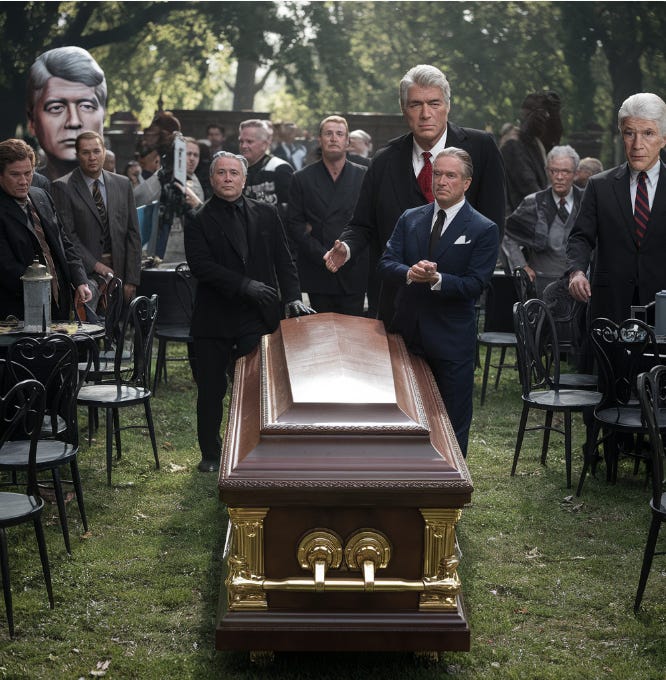From Godfather to Gold Standard: Breaking the Cycle of Moral Hypocrisy in High Crimes, Politics, and Currency
another Sunday Silver Sermon
The juxtaposition of faith and felony in mafia films like The Godfather presents a stark and unsettling irony. These cinematic portrayals reveal a world where ruthless criminals seamlessly blend their brutal underworld activities with devout religious observance, creating a jarring dissonance that challenges our understanding of morality and redemption.
In the shadowy realm of organized crime, we witness hardened men who think nothing of ordering hits, extorting businesses, and corrupting officials, yet cling fervently to their Catholic faith.
They attend Mass with clockwork regularity, participate in baptisms with genuine joy, and mourn at funerals with heartfelt grief. The same hands that pull triggers and count ill-gotten gains fold in earnest prayer, seeking divine guidance and forgiveness.
This peculiar duality speaks to a deeply ingrained cultural identity, where faith and family intertwine with criminal enterprise in a complex tapestry of tradition and loyalty. The mafia's adherence to religious rituals becomes a twisted form of absolution, a weekly cleansing that allows them to return to their nefarious activities with a clear conscience.
Perhaps these men view their Sunday devotions as a spiritual reset button, wiping clean the slate of sins accumulated throughout the week.
The confessional becomes a convenient dumping ground for guilt, a place where whispered admissions and prescribed penance serve as a get-out-of-hell-free card. This cycle of sin and sacrament creates a perverse equilibrium, allowing them to compartmentalize their actions and maintain a semblance of righteousness.
The generational nature of this lifestyle further complicates matters. Sons follow in their fathers' footsteps, inheriting not just a criminal empire but also a warped moral code that justifies their actions through a lens of family loyalty and cultural tradition. The rituals of both the church and the cosa nostra become intertwined, creating a toxic brew of faith and felony that perpetuates itself through the generations.
In the end, this ironic dance between devotion and depravity serves as a stark reminder of human complexity and our capacity for self-deception. It challenges us to examine our own moral inconsistencies and the ways we might use faith as a shield against confronting our darker impulses.
Crime Syndicate: U.S. domestic, monetary, and foreign policies
The intertwining of U.S. domestic, monetary, and foreign policies reveals a complex system where political leaders often engage in morally questionable practices while simultaneously seeking alignment with religious figures and causes.
This paradoxical behavior mirrors the irony seen in mafia films, where criminals attend church services between violent acts.
In the realm of economic policy, politicians design systems that systematically disadvantage workers through intentional inflationary measures, effectively reducing the purchasing power of wages. Meanwhile, foreign policy decisions frequently lead to lucrative war profiteering schemes, funneling taxpayer money into the pockets of defense contractors and private military companies.
Domestically, leaders may support policies that exacerbate income inequality or weaken social safety nets, all while courting religious voters. They might attend anti-abortion rallies with the religious right or join civil rights marches alongside progressive faith leaders, seeking moral credibility despite their questionable actions in office.
This dichotomy between public displays of piety and behind-the-scenes machinations echoes the mafia's dual nature. Just as mobsters sought absolution through religious rituals, politicians attempt to cleanse their reputations by associating with moral authorities. However, this veneer of righteousness often fails to mask the underlying corruption and self-serving nature of their policies, leaving a trail of economic and social destruction in their wake.
Gold and Silver Represents a Way to Resist and Restore Honesty
In a world plagued by economic manipulation and political deceit, a return to honest money—gold and silver—could be the key to unlocking a more just and prosperous society for all. By embracing a decentralized monetary system based on precious metals, we can strip politicians of their ability to print money at will, effectively putting an end to the insidious debasement of our currency.
This shift would have far-reaching consequences. Without the ability to fund wars through monetary expansion, the endless cycle of conflict that has defined our foreign policy could finally be broken. Domestically, a stable currency would preserve the purchasing power of workers' wages, making basic necessities like food, shelter, and healthcare more accessible. This economic stability could, in turn, lead to a significant reduction in crime, as desperation-driven offenses would become less prevalent.
Moreover, the act of purchasing and holding physical gold and silver represents a powerful form of individual resistance against the schemes of the ruling elite. By opting out of the fiat currency system, citizens can protect their wealth from inflation and economic manipulation. This decentralized approach to savings empowers individuals, reducing their reliance on a corrupt financial system and the politicians who exploit it.
In essence, embracing honest money could be the most potent weapon in our arsenal against systemic injustice. It offers a path to economic freedom, social stability, and a more equitable distribution of wealth. By choosing gold and silver, we not only secure our own financial futures but also contribute to a broader movement that challenges the very foundations of political and economic power. This grassroots revolution in personal finance could be the catalyst for sweeping changes, ushering in an era of true prosperity and justice for all.





